This Chicago Deep Dish Pizza is perfect for sinking your teeth into! Thick homemade pizza dough serves as the signature base to a robust sauce made from scratch, gooey mozzarella cheese, and both pepperoni and hearty Italian sausage. One slice is sure to fill you up, but that won’t stop you from coming back for more!
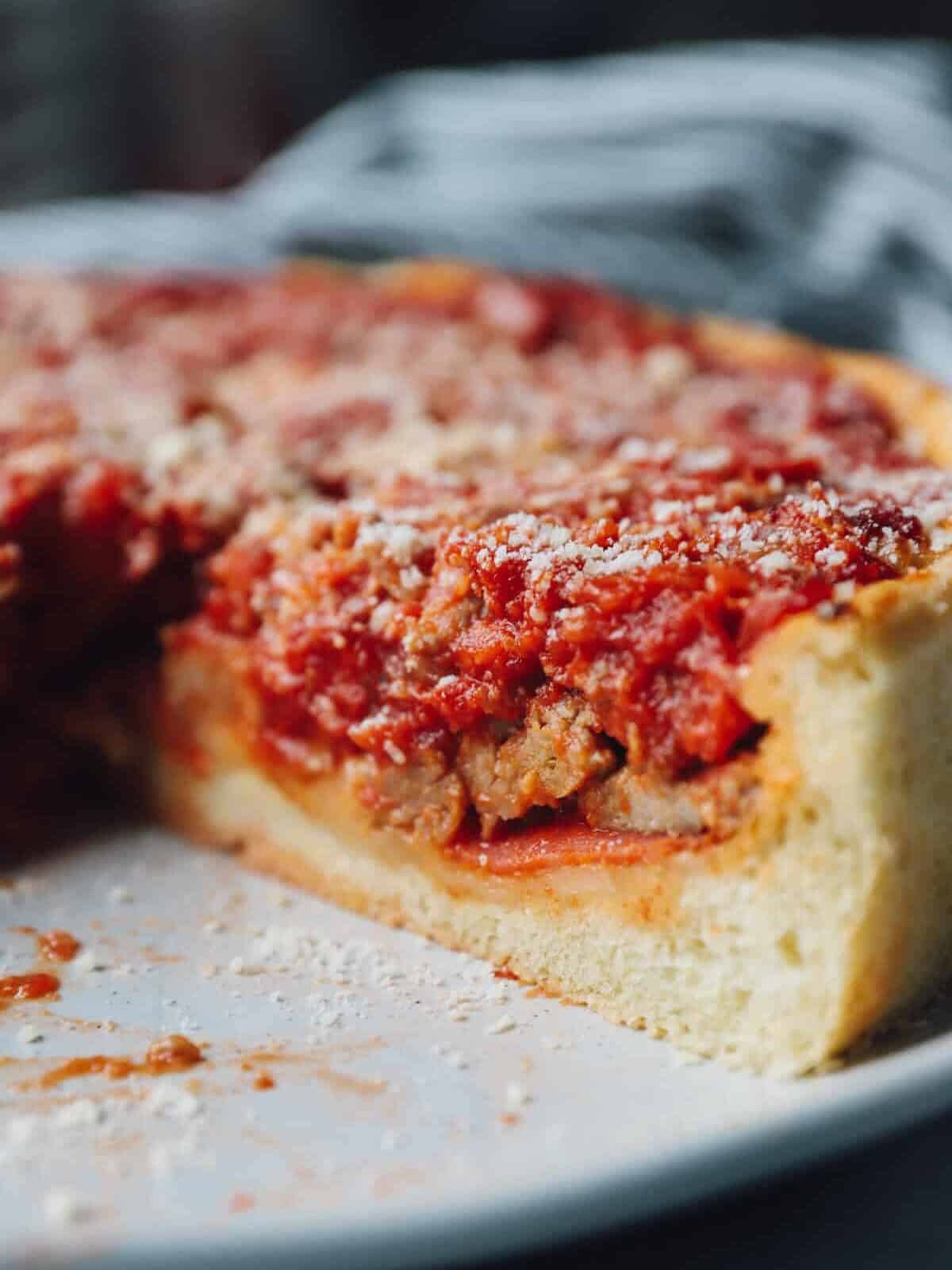
This post may include affiliate links that earn us a small commission from your purchases at no extra cost to you.
What’s in the Best Chicago Deep Dish Pizza?
Pizza dough baked to thick, soft, chewy perfection under a bed of homemade sauce, gooey mozzarella cheese, and hearty meats create an undeniably delicious deep dish pizza. There’s a reason it’s only gotten more popular every year since its creation in 1943!
- Water: Warm water hydrates the pizza dough and activates the yeast. You want the water to be about 105-110°F. Any cooler, and it won’t activate; any hotter will kill the yeast.
- Yeast: Active dry yeast helps the dough to rise. You can use instant yeast instead, but be sure to read instructions on how to use it properly.
- Sugar: Granulated sugar feeds the yeast in the dough so that it can rise and cuts the acidity in the tomato sauce for a balanced flavor.
- Flour: All-purpose flour forms the base of our pizza dough.
- Cornmeal: Yellow cornmeal adds a bit of texture to the dough and helps to prevent it from sticking to the pan.
- Salt: Kosher salt enhances the flavors of the dough and the sauce! If using a finer-grain salt, like sea salt or table salt, reduce the amount by half.
- Oil: Olive oil adds moisture, fat, and flavor to the dough and the sauce.
- Butter: Unsalted butter helps create flaky layers in the dough.
- Onion and Garlic: Classic Italian flavors that create a base for the sauce.
- Tomato Paste: Adds rich tomato flavor to the sauce without thinning it out too much. Watery sauce will weigh down the pizza, causing it to be raw in the middle.
- Italian Seasoning: Adds delicious Italian flavor to the sauce.
- Tomatoes: Crushed tomatoes form the base of the sauce.
- Cheese: Freshly shredded mozzarella cheese is the classic choice for this pizza, while Parmesan adds a nice umami saltiness to the pie.
- Pepperoni and Sausage: Sliced pepperoni and ground Italian sausage are a classic Chicago pizza pairing.
Pro Tip: For a chewier pizza crust, swap the all-purpose flour for bread flour!
Variations on Chicago Style Deep Dish Pizza
I love the classic combination of pepperoni and sausage, but you can really make up this pizza any way you like! Try your hand at some local classics, such as:
- Chicago Fire: spicy sausage, fire roasted red peppers, and red onions.
- Meat Lovers: bacon, Canadian bacon, sausage, and pepperoni.
- Jalapeño Blue: bacon, blue cheese, and sausage, plus jalapeños stuffed with bacon and blue cheese.
- Spinach Margherita: spinach, cherry tomatoes, fresh mozzarella, basil.
- Chi-Talian Stallion: Italian beef, roasted sweet peppers, giardiniera.
- Taco: ground beef, taco seasoning, Mexican cheese blend, beans, onions, and black olives.
- Buffalo Chicken: Buffalo sauce, ranch, blue cheese crumbles, red onion, and Buffalo chicken.
- Hawaiian: Canadian bacon and pineapple.
- Vegetarian: mushroom, onion, and green pepper.
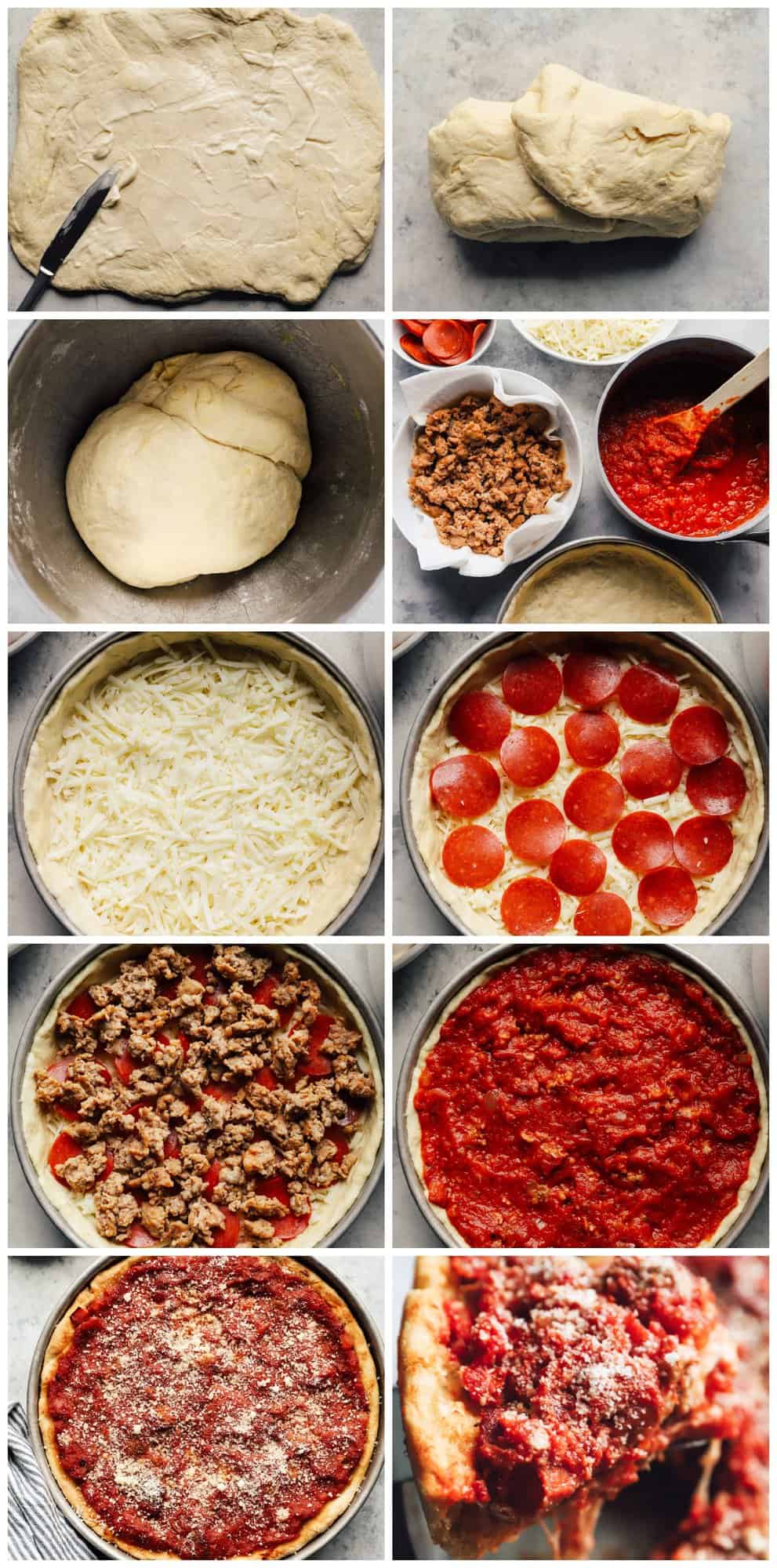
Chicago deep dish pizza is instantly recognizable due to its incredibly deep crust, abundance of toppings, and saucy top. Chicago-style deep dish pizza is arranged differently than a typical pizza, with cheese on the bottom, followed by toppings, then sauce, and a sprinkle of Parmesan.
With a regular pizza, the dough is stretched into a wide circle and the dough is rolled in on itself to create a crust. With Chicago deep dish pizza, the crust is pressed into a tall baking pan (like a cake pan) to create a more pie-like appearance. This allows for more toppings, cheese, and sauce to be added to the pizza.
I like to use a 9-inch round cake pan, but you could also use a cast-iron pan.
To bloom yeast means to dissolve it in warm liquid (often with a little bit of sugar) and leave it for a few minutes, or until foamy. Proofing yeast ensures that it is alive and vigorous enough to make your dough rise.
Dense or heavy pizza is usually caused by not kneading the dough long enough. Be sure to knead the dough until it is smooth and elastic. If your dough is properly kneaded, it should slowly spring back when pressed with one finger. If it springs back too quickly, it is under-kneaded. If it does not spring back at all, it is over-kneaded. The same tips can be used to tell if the dough has been proofed enough. Too springy means under-proofed and not springy enough means over-proofed.
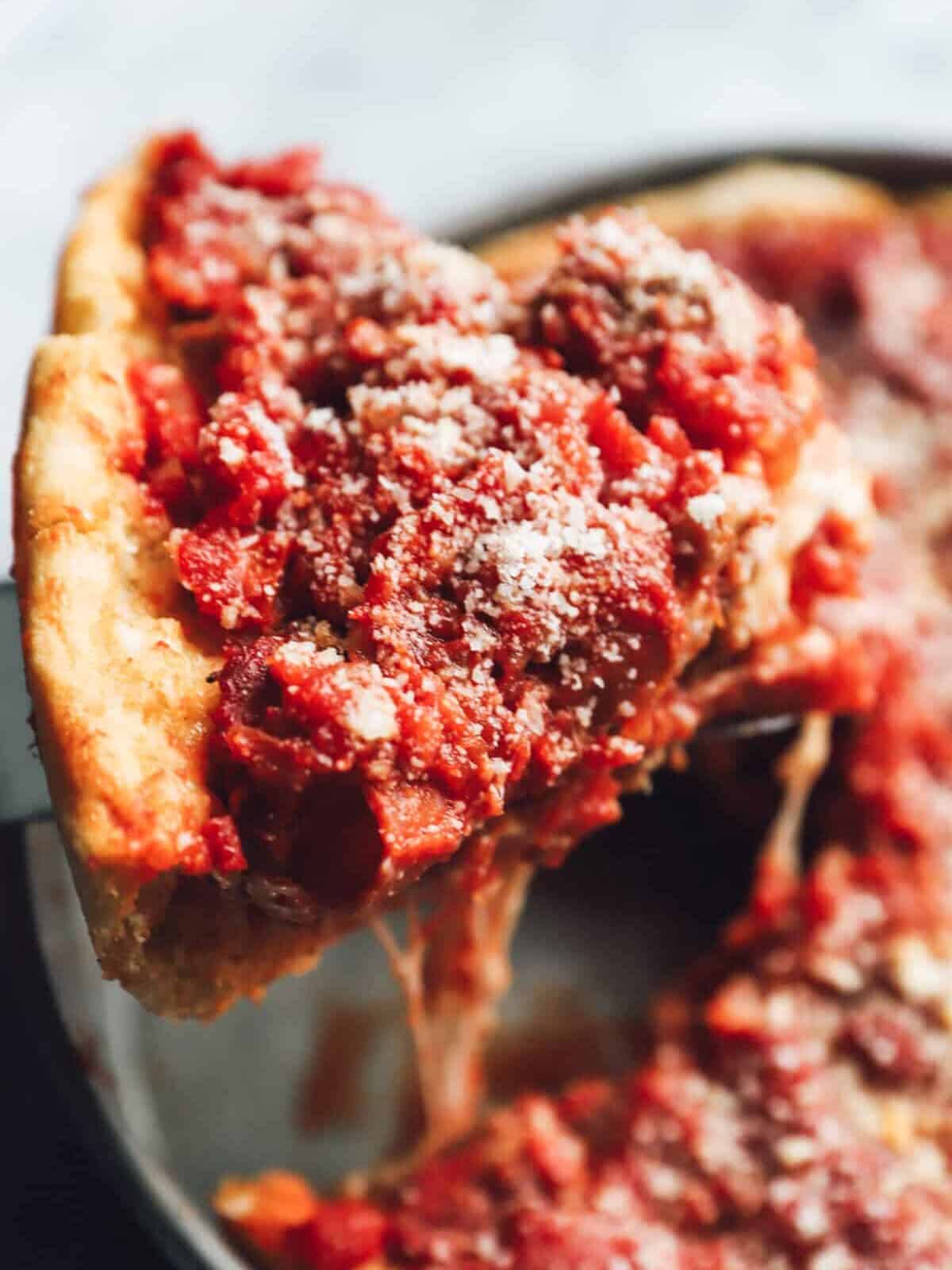
How to Make Ahead and Store Deep Dish Chicago Pizza
You can prepare the dough through step 4 and place it in the refrigerator for up to 24 hours to slowly rise rather than letting it rise on the countertop.
Store leftover Chicago deep dish pizza in an airtight container in the refrigerator for up to 3 days.
How to Freeze and Reheat Chicago’s Best Deep Dish Pizza
Freeze Chicago deep dish pizza whole or cut into individual slices tightly wrapped in 2 layers of plastic wrap and 1 layer of aluminum foil for up to 2 months. Let thaw overnight in the refrigerator before reheating in a 350°F oven loosely covered with foil for 15-20 minutes, until warmed through.
What to Serve with Chicago Deep-Dish Pizza
There’s no denying that this hearty pizza is a meal all by itself, but I love to serve a pizza shop spread when I make my pizzas. A fresh chopped salad helps to cut through the richness of the pizza for an easy weeknight meal. Or opt for a more classic Caesar salad. For a party or family gathering, sides like Buffalo wings, mozzarella sticks, and garlic bread muffins help fill up a large group.

Chicago Deep Dish Pizza
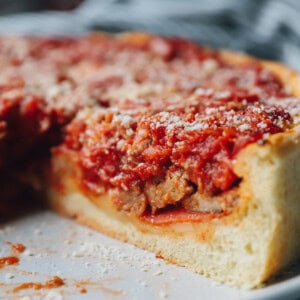
Equipment
- Kitchen Scale (optional, for the dough)
- Stand Mixer
- Rolling Pin
- 2 9-inch Round Cake Pan
Ingredients
For the Dough
- 1½ cups water 341 grams, warm (105-110°F)
- 2¼ teaspoons active dry yeast 7 grams (1 envelope)
- 1½ teaspoons granulated sugar 9 grams
- 3½ cups all-purpose flour 420 grams
- ½ cup yellow cornmeal 78 grams
- 1½ teaspoons kosher salt 5 grams
- 3 tablespoons olive oil 38 grams, divided
- 4 tablespoons unsalted butter 57 grams, room temperature (½ stick)
For the Sauce
- 1 tablespoon olive oil
- ½ onion finely chopped
- ½ teaspoon kosher salt
- 2 cloves garlic minced
- 1 tablespoon tomato paste
- 1 teaspoon Italian seasoning store-bought or homemade
- 28 ounces crushed tomatoes (1 can)
- 1½ teaspoons granulated sugar
Meat and cheese:
- 8 ounces mozzarella cheese shredded (1 block)
- 6 ounces pepperoni slices (1 package)
- 1 pound ground Italian sausage cooked
- ¼ cup freshly grated Parmesan cheese
Instructions
For the Dough
- Add the water, yeast, and sugar to a small bowl, and let the yeast bloom for a few minutes.1½ cups water, 2¼ teaspoons active dry yeast, 1½ teaspoons granulated sugar
- Add the flour, cornmeal, and salt to the bowl of a stand mixer fitted with the paddle attachment. Mix on low until combined.3½ cups all-purpose flour, ½ cup yellow cornmeal, 1½ teaspoons kosher salt
- Add in the yeast mixture and 2 tablespoons oil. Mix on low for a couple of minutes, until the dough comes together.3 tablespoons olive oil
- Add a tablespoon of olive oil to a large bowl. Transfer the dough to the bowl, toss it in the olive oil, cover with plastic wrap, and let it rest for 1½-2 hours, until it has doubled in size.
- Transfer the dough to a floured work surface. Roll it out into a 9×12-inch rectangle.
- Spread the butter over the dough. Then, roll the dough up to create a log, seam side down.4 tablespoons unsalted butter
- Fold the dough into thirds to create a small rectangle.
- Cut the rectangle in half, and shape each piece into a ball.
- Return the balls of dough to the bowl, and let rest in the refrigerator for 45 minutes.
For the Sauce
- While the dough is resting again, add the olive oil to a large skillet set over medium heat.1 tablespoon olive oil
- Add in the onion, sprinkle with salt, and cook until softened. Add in the garlic and cook for another 1-2 minutes.½ onion, ½ teaspoon kosher salt, 2 cloves garlic
- Stir in the tomato paste and Italian seasoning, then add in the crushed tomatoes and sugar.1 tablespoon tomato paste, 1 teaspoon Italian seasoning, 28 ounces crushed tomatoes, 1½ teaspoons granulated sugar
- Cook, stirring occasionally, for 25-30 minutes until the sauce has reduced and thickened. Taste, and add salt if needed.
Assembly and Baking
- Preheat oven to 425°F. Generously coat two 9-inch round baking pans with olive oil.
- Firmly press the dough into the bottom and up the sides of the pan.
- Spread the shredded cheese in an even layer over the crust.8 ounces mozzarella cheese
- Top with pepperoni and Italian sausage.6 ounces pepperoni slices, 1 pound ground Italian sausage
- Spread the sauce over the pepperoni and sausage, then sprinkle the grated Parmesan over the sauce.¼ cup freshly grated Parmesan cheese
- Repeat for the 2nd crust.
- Bake for 20-25 minutes, until the crust is golden brown.
- Let the pizza rest for 5-10 minutes before slicing.
Video
Becky’s Tips
- If your dough is properly kneaded, it should slowly spring back when pressed with one finger. If it springs back too quickly, it is under-kneaded. If it does not spring back at all, it is over-kneaded.
- If the dough retracts when you try to stretch it in the pan, cover it and let it rest for a few minutes before trying again.
- Make sure your sauce is nice and thick; otherwise, it could leak out of the pizza or cause it to become soggy.
- Layer the pizza as directed. This will help prevent it from becoming soggy.
Nutrition information is automatically calculated, so should only be used as an approximation.


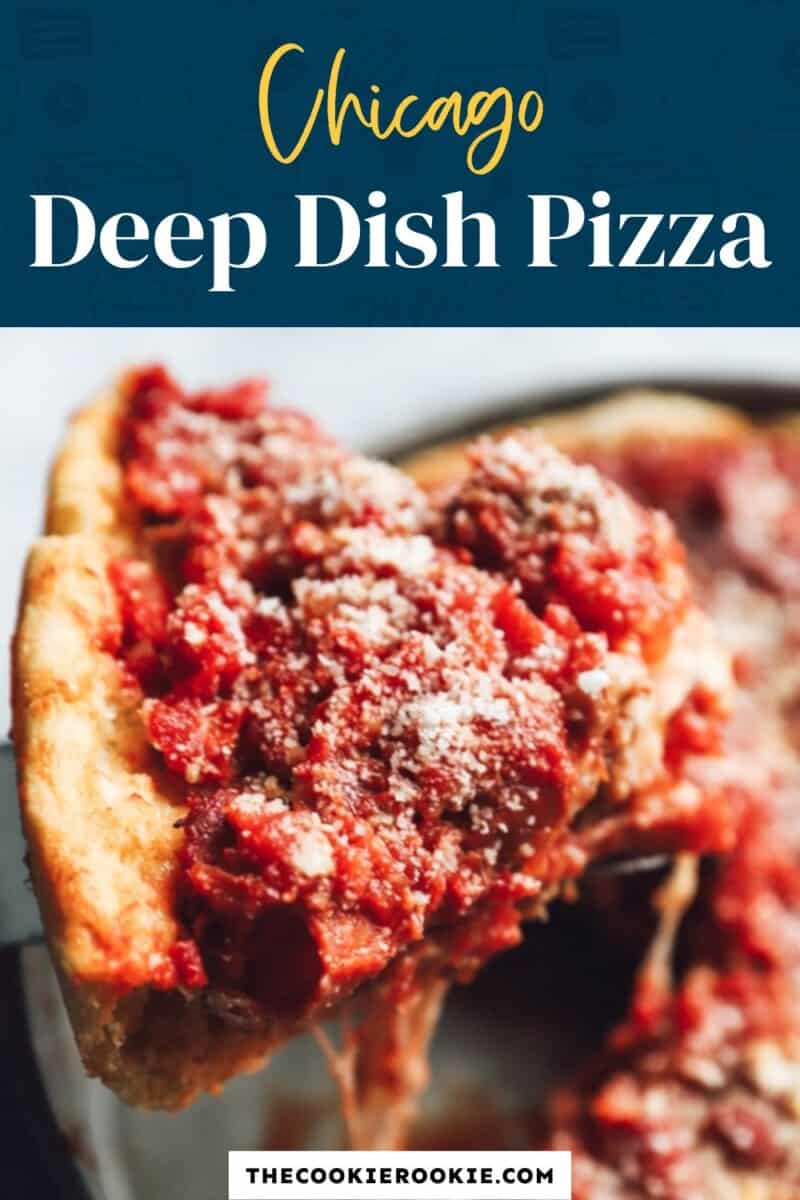













It is really good and the best kind of pizza.
I have tried several Chicago deep dish recipes from Pinterest. I get raves from family and friends on this one. Now it is my go to recipe to dazzle guest and family. Thank you for sharing this recipe.
We’re sorry you didn’t enjoy our interpretation, David!
Becky,
Two questions about this recipe before I try it.
1) I do not see details about kneading. Are you saying that using the stand mixer is sufficient? I would think that it requires additional kneading.
2) The hydration level is quite high (81%). Or do you consider the weight of the cornmeal , making the hydration 67%.
Hi, Mark! Yes, the mixing in the stand mixer should be enough! This is a high hydration dough as well, but the cornmeal does help!